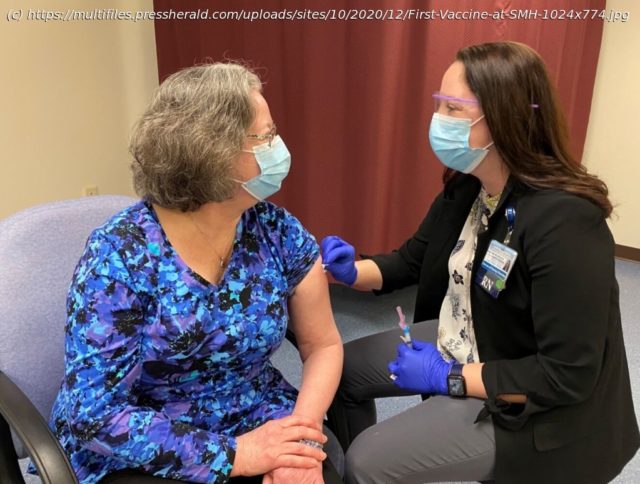While many people will experience milder side effects after vaccination, severe allergic reactions have been rare in Maine and nationwide so far.
More than 58,000 doses of COVID-19 vaccines had been administered in Maine as of Tuesday morning, with thousands more doses being injected into arms daily. But Maine’s vaccination plan will be a months-long effort, and many people have questions about how it will play out. Here are answers to some common questions about the vaccination rollout and what to expect in the coming months. Have other questions? Email them to [email protected]. As with any vaccine, recipients of COVID-19 shots can experience pain or swelling at the injection site, fever, tingling or other symptoms soon after vaccination. These are fairly common side effects because vaccines work by triggering an immune system response in order to essentially teach the body to recognize and fight off the real virus down the road. Severe allergic reactions are rare, however. Nationwide, there were 3,912 “adverse reactions” to COVID-19 vaccines reported to the U.S. Centers for Disease Control and Prevention as of Dec.31,2020. About 2.8 million people had received the first dose of vaccine by then, which translates to reactions in 0.1 percent of recipients. There have undoubtedly been more allergic reactions since the pace of vaccination has increased, but that is the most recent data available on the US CDC’s Vaccine Adverse Event Reporting System. In Maine, there were 34 adverse reactions reported to the federal database among individuals who received shots between December 17 and December 24, which is the last available date for Maine and many other states. The Maine Center for Disease Control and Prevention relies on the federal CDC’s database to track vaccine reactions. Among those 34 reactions, the majority involved temporary dizziness, nausea, hives, headaches, body aches or fever – all symptoms of the vaccine triggering an immune response, as expected. In most cases, the symptoms either faded within several hours or dissipated over the course of a day or two. At least six individuals were taken to emergency rooms for monitoring, and one patient (who was asthmatic) required epinephrine and other allergy-related medications to address breathing problems. Nationwide, there were just 29 case of anaphylaxis — a severe, life-threatening allergic reaction also known as anaphylactic shock — reported in the U.S. as of last week and no deaths tied to the reactions, according to the federal CDC. “This is still a rare outcome,” Dr. Nancy Messonier, director of the US CDC’s National Center for Immunization and Respiratory Diseases, said during a press conference last week, according to NBC News. “Right now, the known and potential benefits of the current COVID-19 vaccines outweigh the known and potential risks of getting COVID-19.” Anyone who receives a COVID-19 vaccine should be monitored by on-site health professionals for at least 15 minutes, or longer, in case of reactions. Researchers are still looking into this but preliminary evidence suggests that some allergies could increase the risk of a reaction to COVID-19 vaccines. That said, federal health officials guidance still recommends COVID-19 vaccines for many people who have allergies to things other than vaccines. “CDC recommends that people with a history of severe allergic reactions not related to vaccines or injectable medications — such as food, pet, venom, environmental, or latex allergies — get vaccinated,” the agency stated in a December 31 update on allergies.
Домой
United States
USA — Science Updated Q&A: I have allergies. Should I still get a COVID-19 vaccine?






